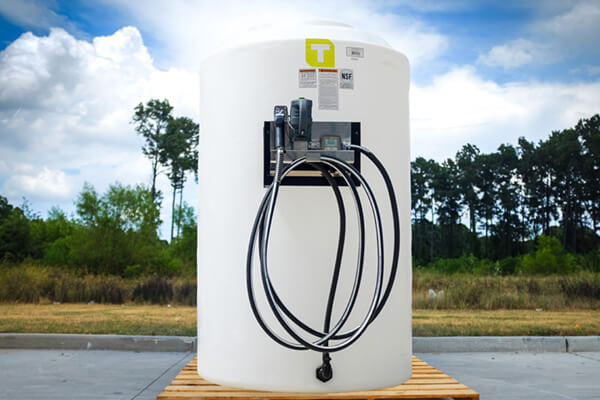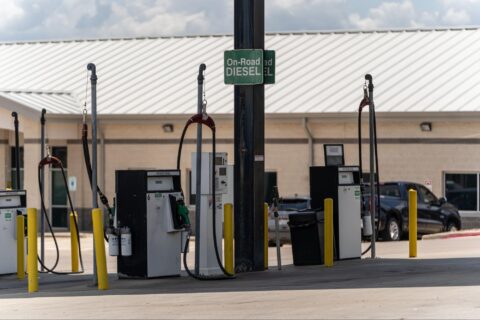The Connection Between DEF and Engine Efficiency
What is exhaust fluid for diesel engines?
Although diesel hasn’t had the best of times lately, a growing body of research and development is attempting to improve the fuel’s reputation and restore diesel vehicles’ viability in the long run. A non-hazardous mixture of 67.5 percent ionised water and 32.5 percent urea is called diesel exhaust fluid (DEF). It is an essential part of Selective Catalytic Reduction (SCR) technology, which is widely acknowledged as the best way to lower Nitrogen Oxide (NOx) concentrations and satisfy emission regulations by lowering the quantity of air pollution produced by diesel engines.
It is added to a different tank in the car and is neither fuel nor fuel additive. The idea of DEF Technology is that maintaining a specific level of DEF in the tank is necessary to avoid negative effects on the vehicle’s performance, which could result in a breakdown.

DEF Impacts on Vehicle – Why Apply DEF?
Since diesel engines emit dangerous emissions to both the environment and human health, DEF is essentially used as an after-treatment to make all diesel-powered engines safe to operate.
Compliance
Engine Efficiency and DEF technology will also see enhanced performance and fuel efficiency. Enhancing the system’s ability to convert a greater amount of NOx into benign gas and water results in improved engine performance and enhanced fuel efficiency. Insufficient amounts of Diesel Exhaust Fluid (DEF) may greatly reduce the speed of your vehicle, and normal engine performance will only be restored once you replenish the DEF.
Potency
It is advisable to preserve the effectiveness of your vehicle’s Diesel Exhaust Fluid (DEF) for a period of two years to experience DEF Engine Performance. Avoid exposing your DEF reservoir to sunlight as it may shorten its shelf-life.
DEF Technology offers thermal insulation during the winter season. DEF solidifies at a certain temperature. Nevertheless, during engine operation, the technology enables the heat to defrost the engine and maintain its functionality even in extremely cold conditions. There is no requirement to include anti-freeze solutions in the diesel exhaust fluid transfer tanks as a precautionary measure against potential harm.
Ecological Advantage
The fluid is an aqueous solution consisting of water and urea. When fed into the exhaust system of diesel engines, it serves a vital role in diminishing detrimental nitrogen oxide emissions through the Selective Catalytic Reduction (SCR) system, which is widely used in contemporary diesel engines.
Engines employing diesel exhaust fluid demonstrated a continuous increase in fuel economy. The average fuel efficiency shown an increase ranging from 3% to the maximum of 5%. The SCR system operates efficiently by using DEF, resulting in a decrease in exhaust gas recirculation and thereby enhancing overall efficiency.
At first look, this enhancement in DEF and Fuel Efficiency may appear to be insignificant. Nevertheless, for the duration of an engine’s existence, particularly in vehicles that go extensive distances such as long-haul trucks, this might result in substantial cost reductions.
Nitrogen Oxide emissions are toxic gases that significantly contribute to environmental pollution and are frequently held responsible for the occurrence of acid rain and the greenhouse gas impact. Thus, by utilising DEF, you not only adhere to environmental rules but also contribute to environmental preservation. DEF decomposes Nitrogen Oxide gases into nitrogen and water, which are benign in isolation.
Expense
Today Diesel Engines and DEF go parallel in the automotive industry. It is imperative to consistently replenish your Diesel Exhaust Fluid (DEF) tank to ensure it remains at optimal levels.
This practice contributes to the overall expenses associated with owning a machine or vehicle that is powered by a diesel engine. Nevertheless, the advantages you receive for your well-being and the ecosystem are immeasurable. It is advisable to seek assistance from a certified agency while refilling your diesel exhaust fluid tanks, as dumping it elsewhere may result in engine damage. Usually, you need to replenish your fuel tank every quarter of the duration it takes to fill it.
Utilising Diesel Exhaust Fluid (DEF) can enhance fuel efficiency by a maximum of 5%.
The significance of Diesel Exhaust Fluid in diesel engines has garnered much attention, particularly regarding its influence on fuel efficiency. A recent study has provided elucidation to this discourse, unveiling that DEF can effectively augment fuel efficiency, potentially elevating it by up to 5%.
DEF Impacts on Vehicle – Insufficient DEF levels reduce speed of vehicle
The DEF Supply System is crucial for the optimal operation of a diesel engine vehicle that is equipped with Selective Catalytic Reduction (SCR) technology. The SCR system is specifically engineered to mitigate detrimental nitrogen oxide emissions, hence fostering the propagation of unpolluted air and safeguarding the environment.
Insufficient levels might have a substantial impact on the vehicle’s performance. A prominent consequence of low DEF levels is a decrease in the speed of the vehicle. This occurrence arises when the vehicle transitions into a state known as “limp mode” in order to prompt the driver to replenish the fuel tank. Limp mode restricts the engine’s power output, resulting in a decrease in the vehicle’s maximum speed. This aids in safeguarding the integrity of the SCR system and guarantees that emissions remain compliant with legal thresholds.
Why DEF is Essential for Your Diesel Engine
Diesel Exhaust Fluid (DEF) is a mixture of water and urea, designed to reduce harmful emissions in diesel engines. It’s essential for improving engine efficiency and ensuring your vehicle runs smoothly while adhering to environmental standards.
Key Benefits of DEF:
- Improved Engine Efficiency: By reducing nitrogen oxide (NOx) emissions, DEF helps your engine burn fuel more effectively, improving overall engine efficiency.
- Fuel Savings: With DEF, your engine operates more efficiently, which can lead to fuel savings of up to 5%. This is especially important for long-haul vehicles.
- Longer Engine Life: Regular use of DEF helps reduce carbon build-up in the engine, leading to longer engine life and fewer maintenance issues. This is why DEF and engine longevity go hand in hand.
DEF for Heavy-Duty Vehicles:
For heavy-duty vehicles, DEF is a must. These vehicles often carry large loads and travel long distances. Using DEF not only helps reduce fuel consumption but also ensures compliance with stricter emissions regulations.
- Enhances engine performance for heavy-duty use.
- Prevents excess wear and tear by reducing engine stress.
Proper DEF Storage and Quality:
To get the most out of your DEF, proper DEF storage and quality are crucial. Here’s how you can maintain it:
- Store DEF in a cool, dry place to avoid degradation.
- Ensure DEF is within its shelf life to maintain its effectiveness.
Conclusion:
Using DEF in your diesel engine improves engine efficiency, increases fuel savings, and enhances engine longevity. Whether you have a heavy-duty vehicle or a regular diesel engine, DEF is a small investment that pays off in better performance and lower costs.

